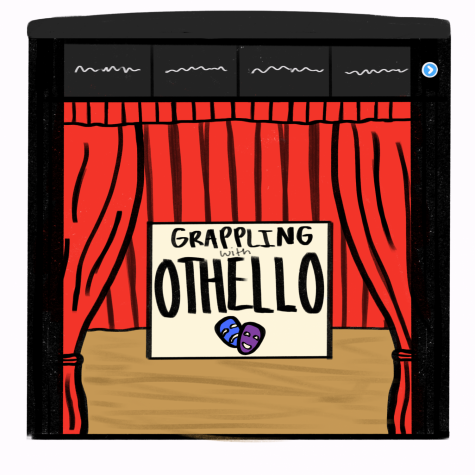“Grappling With Othello” lecture revisits race, violence and the narrative in theatre
April 9, 2021
The curtain rises and the orchestral score swells in an empty Zoom room, giving an appropriately dramatic backdrop to the two guest speakers, Aldo Billingslea and Eric Ting.
On April 2, Billingslea and Ting headlined “Grappling With Othello,” a discussion about their controversial version of Shakespeare’s “Othello.” Their talk centered on themes of performance, radicalism and approaching old works from new perspectives. It was the first of a series called “The State of The Arts,” which explores theatre, the arts and the issues they face in the twenty-first century.

“Grappling With Othello” was hosted by the Theatre and Dance Department Chair, Laura Hope, who introduced the speakers and asked some questions about career trajectories for students who are interested in the theatre business. The guest speakers then described their radical approach to Shakespeare and the controversy surrounding their 2016 run of “Othello,” which featured interjected monologues on racial and gendered violence.
Eric Ting is the director of the California Shakespeare Theatre, often referred to as Cal Shakes. “Othello” was the first play he conducted as the director. He made two unexpected choices in his production. The first was that he and the cast created regular interruptions in the play for a character to speak directly to the audience, even during several key scenes, and also a 10-minute open conversation with the audience.
For example, during the climactic scene where Othello murders his wife, instead of showing this murder, a cast member gives a short address to the audience, describing the process that the human body goes through during strangulation in clinical language. This decision and others like it helped Ting’s process of resistance to the romanticization of Shakespeare.
Ting went into the production with a goal in mind: “I wanted to approach Shakespeare as if it was a new play,” he said.
Secondly, the production addressed race and racism within the central text by casting a Black Cassio, which added a new element of tension between the villainous Iago who felt he deserved a position that Cassio was given.
Additionally, Ting’s “Othello” sought to challenge some of the most problematic aspects of the play, and he described going through the script with the cast and finding specific moments in the text that they thought should be addressed.
The other speaker Aldo Billingslea, a professor of theatre at Santa Clara University, played the titular Othello in the production. While he had played Othello many times before, this production provided a new perspective on the character.
Although Billingslea had just come off a run of Othello, he wanted to explore Ting’s vision and agreed to play the part again. At the talk, Billingslea and Ting discussed a gala held to inaugurate Ting’s new position. Part of the event was a slideshow, displaying the faces of all the directors that came before him. Both Billingslea and Ting recalled the contrast between the series of older white men leading up to Ting, and his speech afterward which stressed how much Ting planned to depart from tradition. To Billingslea, Ting was moving in an interesting new direction, one in which he was glad to play a crucial role.
Jay Tyson, a senior theatre and film major, attended the talk and asked a question of the panelists. The talk resonated with Tyson, who found Ting’s approach to the theatre to be important in the modern world. Like Ting, Tyson is inspired by theatre’s unique role in modern media.
“I think that unpredictability and live nature is why people are interested, and it’s why people go back, and go back a second time.” Tyson said.
For Hope, this talk provided a chance to expose students to ideas and people at the forefront of the theatre and arts community. Hope used to work at Cal Shakes and has worked with Billingslea in the past, and praised his ability as an actor.
“He is somebody who has a lot of artist integrity, and I really admire his work. He is very wise,” Hope said.
Another student, sophomore Natalie Traw, attended the talk and did some administrative work for it. She works in the Harper Joy Box Office, but attended the talk as an audience member. Traw was struck by how the speakers reflected on the reception to their work and how a play as old as “Othello” could still shock audiences when put in a new light.
“It was really amazing to hear the kind of feedback that they got on their performance… It was really interesting to see perspectives from a director and a performer of something that was changed in such a fundamental way that it got such a strong reaction.”
Like the play itself, “Grappling With Othello” was a performance of engagement, of continuing the dialogue these actors started several years ago.
Both events, past and present, sought to open a conversation about racism inherent to many works often put on a pedestal. While the play directly confronted its audience, “Grappling With Othello” provided a reflection on the storied process of this conversation, as well as a chance for students to engage critically with this play as a single performance and as a historical work.





